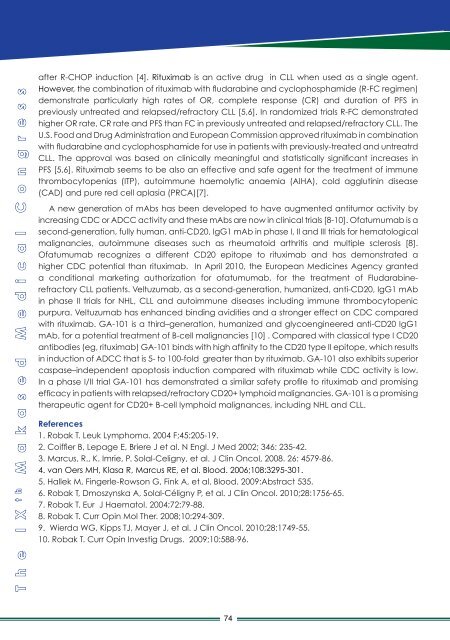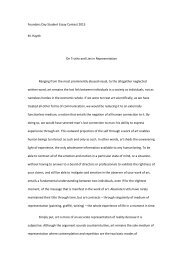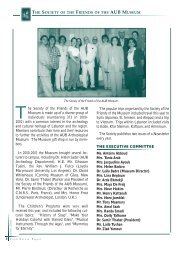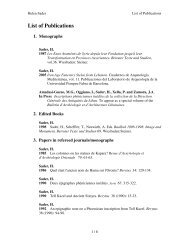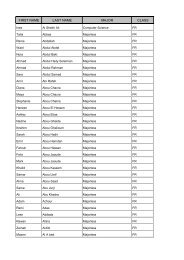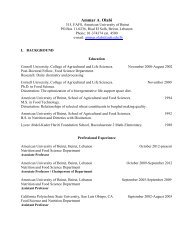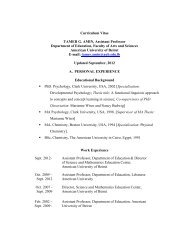The IX t h Makassed Medical Congress - American University of Beirut
The IX t h Makassed Medical Congress - American University of Beirut
The IX t h Makassed Medical Congress - American University of Beirut
Create successful ePaper yourself
Turn your PDF publications into a flip-book with our unique Google optimized e-Paper software.
T h e I X t h M a k a s e d M e d i c a l C o n g r e s s<br />
after R-CHOP induction [4]. Rituximab is an active drug in CLL when used as a single agent.<br />
However, the combination <strong>of</strong> rituximab with fludarabine and cyclophosphamide (R-FC regimen)<br />
demonstrate particularly high rates <strong>of</strong> OR, complete response (CR) and duration <strong>of</strong> PFS in<br />
previously untreated and relapsed/refractory CLL [5,6]. In randomized trials R-FC demonstrated<br />
higher OR rate, CR rate and PFS than FC in previously untreated and relapsed/refractory CLL. <strong>The</strong><br />
U.S. Food and Drug Administration and European Commission approved rituximab in combination<br />
with fludarabine and cyclophosphamide for use in patients with previously-treated and untreatrd<br />
CLL. <strong>The</strong> approval was based on clinically meaningful and statistically significant increases in<br />
PFS [5,6]. Rituximab seems to be also an effective and safe agent for the treatment <strong>of</strong> immune<br />
thrombocytopenias (ITP), autoimmune haemolytic anaemia (AIHA), cold agglutinin disease<br />
(CAD) and pure red cell aplasia (PRCA)[7].<br />
A new generation <strong>of</strong> mAbs has been developed to have augmented antitumor activity by<br />
increasing CDC or ADCC activity and these mAbs are now in clinical trials [8-10]. Ofatumumab is a<br />
second-generation, fully human, anti-CD20, IgG1 mAb in phase I, II and III trials for hematological<br />
malignancies, autoimmune diseases such as rheumatoid arthritis and multiple sclerosis [8].<br />
Ofatumumab recognizes a different CD20 epitope to rituximab and has demonstrated a<br />
higher CDC potential than rituximab. In April 2010, the European Medicines Agency granted<br />
a conditional marketing authorization for <strong>of</strong>atumumab, for the treatment <strong>of</strong> Fludarabinerefractory<br />
CLL patients. Veltuzumab, as a second-generation, humanized, anti-CD20, IgG1 mAb<br />
in phase II trials for NHL, CLL and autoimmune diseases including immune thrombocytopenic<br />
purpura. Veltuzumab has enhanced binding avidities and a stronger effect on CDC compared<br />
with rituximab. GA-101 is a third–generation, humanized and glycoengineered anti-CD20 IgG1<br />
mAb, for a potential treatment <strong>of</strong> B-cell malignancies [10] . Compared with classical type I CD20<br />
antibodies (eg, rituximab) GA-101 binds with high affinity to the CD20 type II epitope, which results<br />
in induction <strong>of</strong> ADCC that is 5- to 100-fold greater than by rituximab. GA-101 also exhibits superior<br />
caspase–independent apoptosis induction compared with rituximab while CDC activity is low.<br />
In a phase I/II trial GA-101 has demonstrated a similar safety pr<strong>of</strong>ile to rituximab and promising<br />
efficacy in patients with relapsed/refractory CD20+ lymphoid malignancies. GA-101 is a promising<br />
therapeutic agent for CD20+ B-cell lymphoid malignances, including NHL and CLL.<br />
References<br />
1. Robak T. Leuk Lymphoma. 2004 F;45:205-19.<br />
2. Coiffier B, Lepage E, Briere J et al. N Engl. J Med 2002; 346: 235-42.<br />
3. Marcus, R., K. Imrie, P. Solal-Celigny, et al. J Clin Oncol, 2008. 26: 4579-86.<br />
4. van Oers MH, Klasa R, Marcus RE, et al. Blood. 2006;108:3295-301.<br />
5. Hallek M, Fingerle-Rowson G, Fink A, et al. Blood. 2009:Abstract 535.<br />
6. Robak T, Dmoszynska A, Solal-Céligny P, et al. J Clin Oncol. 2010;28:1756-65.<br />
7. Robak T. Eur J Haematol. 2004;72:79-88.<br />
8. Robak T. Curr Opin Mol <strong>The</strong>r. 2008;10:294-309.<br />
9. Wierda WG, Kipps TJ, Mayer J, et al. J Clin Oncol. 2010;28:1749-55.<br />
10. Robak T. Curr Opin Investig Drugs. 2009;10:588-96.<br />
74


